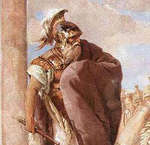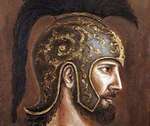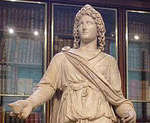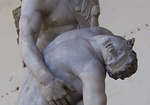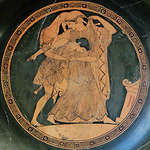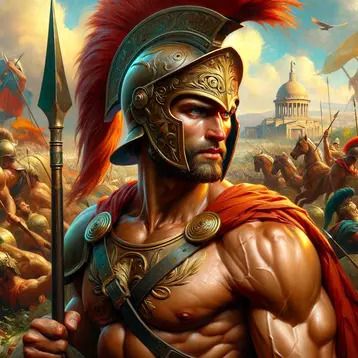
Achilles
Achilles :: The Trojan War Hero
Achilles, the son of Peleus and Thetis, was the greatest of all Greek heroes who took part in the Trojan War. Knowing that her child was destined to either die the death of a glorious warrior or live a long life in obscurity, Thetis bathed Achilles as an infant in the waters of the River Styx, thus making him all but immortal: only the heel by which she held him remained vulnerable. However, as prophesized, this proved costly, because Achilles eventually died from an arrow wound in that heel. Guided by Apollo, the fateful arrow was shot by Paris, the brother of Troy’s most celebrated hero Hector, whom Achilles had previously killed in a face to face duel, in an attempt to avenge the death of his closest friend, Patroclus.
Achilles’ Childhood and Early Career
Achilles’ very birth is interlinked with two important prophecies: one about his mother, and another one about him. Made all but invulnerable by his mother, Achilles would spend his childhood under the mentorship of the Centaur Chiron.
The Prophecy About Thetis, Achilles’ Mother
Achilles was the son of Peleus, king of Thessalian Phthia, and Thetis, a sea-goddess. Even though he did grow up to become the greatest of all Greek heroes, for all we know, he might have even supplanted Zeus as the ruler of the entire universe if it hadn’t been for either Themis’ or Prometheus’ timely intervention.
Namely, a year before Achilles’ birth, both Zeus and Poseidon fell in love with his eventual mother and did their best to win her hand in marriage. And only Themis and Prometheus knew it was vital for the Olympian order that neither of the two marries Thetis, for it had been written “that the sea-goddess should bear a princely son, stronger than his father, who would wield another weapon in his hand more powerful than the thunderbolt or the irresistible trident.”
The Prophecy About Achilles
Whether it was Themis or Prometheus who let the cat out of the bag we may never know, but we do know that she or he did it just in time: Zeus was barely a few moments away from sharing a bed with Thetis.
We also know that Achilles’ eventual father, Peleus, was chosen for a reason: he was, supposedly, the most pious man on the planet, worthy enough of a divine wife. More importantly, he was also a mortal, meaning he couldn’t beget an immortal son.
“Let Thetis accept a mortal’s bed,” Themis counseled the Olympians ominously, “so that she can see her son die in battle, a son who is like Ares in the strength of his hands and like lightning in the swift prime of his feet.”
Achilles’ Heel
Being a goddess, Thetis wasn’t all that happy to be cruelly destined to one day see her son being taken away from her by merciless Death. So, everybody agrees that she did her best to prevent such a thing from ever happening.
Some say that the sea-goddess tried making Achilles immortal through a lengthy purifying ritual which consisted of anointing him with ambrosia every night and slowly burning away his immortality by the fireside, body part by body part. However, right near the end of the ritual, Peleus caught her in the act of putting Achilles in the fire and, understandably, was too shocked to believe any of Thetis’ excuses. The nymph felt so dishonored that she left both her husband and her son and went back to live in the sea with her sister Nereids.
Others, however, claim that soon after Achilles was born, Thetis went to the Underworld and dipped him in the waters of the River Styx. Thus, she managed to make his whole body invulnerable but for the part by which she held him: his left heel. Hence the expression “Achilles’ heel,” meaning “a seemingly small but actually crucial weakness.”
Achilles’ Mentors
In the absence of his mother, Achilles spent most of his childhood on Mount Pelion, where he was reared and trained by the wise Centaur Chiron in numerous disciplines, ranging from hunting to music. Needless to add, Achilles excelled in all of them, and by the time he returned to his father’s home, it was already evident to many that the boy was destined for greatness.
Back in Phthia, Achilles befriended Phoenix and Patroclus, two refugees Peleus had taken in during Achilles’ absence. Both would have an enormous influence on the young Achilles, the latter one becoming his role model and dearest friend.
The Trojan War
Achilles' anger with Agamemnon is the main theme of Homer’s “Iliad” which recounts the last year of the Trojan War, during which Achilles first withdraws from battle and then, enraged by the death of his beloved comrade Patroclus, brings the Greeks the body of Troy’s greatest warrior, Hector.
Pyrrha at the Court of Lycomedes
Realizing that the Trojan War was fast approaching – and fully aware that her son was still destined to die in battle – Thetis resorted to an unusual tactic to keep Achilles safe: she disguised him as a girl and hid him at the court of king Lycomedes in Skyros. The plan worked well for a while, but then Odysseus learned from the prophet Calchas that the Greeks would lose the war without the help of Achilles.
So, he learned his whereabouts and tricked him into uncovering his identity by either disguising himself as a peddler selling jewelry and women’s clothes or feigning an attack on Skyros. In the first case, Odysseus included a spear among his goods and only one girl by the name of Pyrrha showed some interest in it; in the latter, everyone but this Pyrrha fled the scene. Either way, it was all too obvious to Odysseus: Pyrrha had to be none other than Achilles.
The First Nine Years: Telephus, Iphigenia, Tenes
Even though he was the only one not to have taken a vow to fight for Menelaus’ honor, once Odysseus had discovered him, Achilles decided to join the Greek army, commanding a fleet of 50 ships, each one carrying 50 of his men, the mighty Myrmidons.
However, soon after its departure, the Greek fleet lost its way and landed in Mysia by mistake. Mysia was then ruled by Heracles’ son, Telephus, whose army managed to drive the Greeks away from his country. But during the battle, Telephus was wounded by Achilles, and could not be healed in any way whatsoever. After consulting an oracle, he was told that only he who had inflicted the wound would be able to repair it; so, Telephus asked Achilles to heal him, and, in return, he agreed to guide the Greeks to Troy.
Even so, the Greeks soon faced another problem. After killing a sacred deer at Aulis, Agamemnon enraged the goddess Artemis who subsequently decided to hold back the favorable winds until she was offered a human sacrifice in return for her loss: Agamemnon’s oldest daughter, Iphigenia. Iphigenia was lured to Aulis on the pretext of a marriage with Achilles; after finding out that Agamemnon had used him deliberately in such a cruel ruse, Achilles tried to save the life of the poor girl, but barely managed to keep his head on his shoulders: everybody supported Agamemnon’s attempt to appease Artemis. Eventually, Iphigenia agreed to be sacrificed, and the Greeks set sail once again.
Near Troy, Achilles’ fleet landed on the island of Tenedos and in the fight which ensued – contrary to his mother’s advice – Achilles killed Tenedos’ king, Tenes. This enraged Tenes’ father who happened to be none other than Apollo. The Olympian never forgot Achilles’ offense and, eventually, got his revenge.
The Last Year: Achilles in the “Iliad”
A conflict mirroring the one at Aulis kickstarts the tenth year of the Greek campaign against Troy. Agamemnon, the leader of the Achaeans, is forced to give up his concubine Chryseis to appease Apollo and put an end to a plague sent by the god among the Greeks. In return for this, Agamemnon demands another hero’s war-prize – namely, Achilles’ concubine, Briseis. Furious to be dishonored in such a way, Achilles withdraws from battle, even asking his mother Thetis to convince Zeus to help the Trojans, so that Agamemnon and the Greeks recognize promptly the severity of the loss of their greatest warrior.
Zeus nods in agreement and, pretty soon, the Trojans manage to successfully drive the Greeks towards their ships. Agamemnon realizes his mistake and sends Odysseus, Ajax, and Phoenix to Achilles’ tent with an apology and a promise of many fine gifts. Achilles accepts neither: educated by his mother that he is destined to either die at Troy as a glorious warrior or live a long life in obscurity at home, he informs Agamemnon’s embassy that he has now chosen the latter.
Fearing ultimate defeat, Patroclus asks Achilles for his armor and, disguised as his treasured friend, he leads a successful attack against the Trojans. However, taken by the moment, he goes a step too far and is subsequently killed by the fearless Trojan prince, Hector.
Enraged by his friend’s death, Achilles rejoins the battle and, adorned with new armor made by Hephaestus, he tracks down Hector and kills him in a face to face duel. Still burning with anger, Achilles drags Hector’s lifeless body with his chariot for eleven days straight, until the gods intervene and help Priam, Hector’s father, to reach Achilles’ tent and beg for the body of his son. Achilles is moved to tears by this act and agrees to give Priam his son’s body.
The Death of Achilles
Although predicted by Hector with his dying breath, the death of Achilles is not narrated in the “Iliad.” However, as predicted, it does occur relatively soon after Hector’s death: Paris, Hector’s cowardly brother, manages to kill the greatest of the great heroes with an arrow hitting Achilles’ heel, the only vulnerable part of his body. Poisoned or not, the arrow was most certainly guided by the god Apollo, since Paris was no archer of renown. Thus, Achilles paid dearly for disobeying his mother’s wishes and killing Tenes.
The Ghost of Achilles
One of the shades that Odysseus encounters after descending in the Underworld in Homer’s “Odyssey” is the one of Achilles, apparently some kind of a minor ruler of the dead souls in its region. Upon realizing this, Odysseus admires Achilles for being blessed in death as much as he had been in life. “If I could choose,” replies Achilles memorably to this, “I would rather be a paid servant in a poor man's house and be above ground than king of kings among the dead.”
Achilles Sources
Achilles is the central character of Homer’s “Iliad.” In Pindar’s 8th Isthmian Ode, you can read more about the prophecy surrounding his mother, and in Apollodorus all about how Thetis tried making Achilles immortal. Odysseus’ meeting with his ghost is narrated in the 11th book of the “Odyssey.”
See Also: Peleus, Thetis, Agamemnon, Paris, Hector, Patroclus, Trojan War
Achilles Video
Achilles Q&A
Link/Cite Achilles Page
Written by: The Editors of GreekMythology.com. GreekMythology.com editors write, review and revise subject areas in which they have extensive knowledge based on their working experience or advanced studies.
For MLA style citation use: GreekMythology.com, The Editors of Website. "Achilles". GreekMythology.com Website, 08 Apr. 2021, https://www.greekmythology.com/Myths/Heroes/Achilles/achilles.html. Accessed 27 April 2024.

